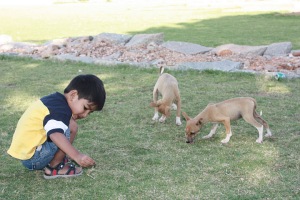A change in life
Compassion towards animals should be part of our basic learning, writes animal welfare worker and our reader Sujaya Jagadish.
“Hello, my name is Sujaya Jagadish and I am an animal welfare worker” – thus I introduce myself at a get together. The person I am introducing myself to, and a few others around look at me strangely, making me wonder why.
In this fast-moving and ever-growing country, people have started to lose touch with basic reality. Everyone is so busy with their profession, games (electronic ones included) family and self-indulgence that to them the words ‘compassion towards animals’, ‘welfare of animals’, ‘ahimsa and non violence’, sound very strange. Many are insensitive towards animals and may even be (intentionally at times) passing on the same insensitivity to their children. In fact, I have heard and seen many parents teaching their children to stone a poor animal on the street even though the animal has done them no harm.
Teach your children that animals mean no harm
What are we doing to these young and beautiful minds? If children are not taught to be compassionate towards other living creatures, they will grow up to be citizens who will probably not value or respect their own aged parents. Our future generation needs to be more compassionate than ours as the challenges are increasing. Let us teach our children to be humble, to love and respect all creatures and take part in animal welfare activities. Parents must understand that their children have a lot to learn from animals and must encourage them to be sensitive to them. We should feel proud when our children rescue animals and take care of them. There are many such examples. The society needs more animal welfare workers in India. Children with adults should take up the challenge of saving our animals and creating an environment that is congenial for both humans and animals to live in. We must create a world that is a win-win for all.
The important areas to be addressed immediately are:
- Leather industry where animals are skinned ruthlessly even when they are still alive.
- Meat industry where animals including male calves (viewed to be not useful) and old cows (job is done and so not useful anymore) are sold to slaughter houses. They are made to walk thousands of miles or are overloaded in vehicles where most of them die due to stampede or suffocation before they reach their destination.
- Chicken industry where chicken are kept cramped in cages.
- Street entertainment and circus industry where monkeys, snakes, dancing bears and other circus animals like elephants, big cats, etc., go through unthinkable torture and trauma. You can see the pain and defeat in their eyes.
- Transport industry where donkeys, bullocks, ponies are over loaded and have to move along the streets with vehicles honking at them and they are being beaten to keep up with the traffic.
- Dairy industry where cows and buffaloes are allowed to eat from the garbage on the streets where they consume plastic, paper, needles, batteries, etc. The owner takes no responsibility of them but of course extracts milk from them at the end of the day.
- Pet industry where dogs and cats live on roads because they are ownerless. Due to negligence of pet owners many of the small animals are forced to live on the streets and scavenge for themselves. They are stoned and kicked around. They come under the vehicles and are left to die on the streets. No one lifts a finger to help these dying animals.
Deforestation, urbanization and the greed of man has caused devastating problems to animals and nature. We must take time to think about these problems. It would be fruitful if animal welfare and awareness programs in schools, colleges, and social groups are introduced. Children and adults need to join hands to take to the streets and do hands-on for peaceful co-existence. Media needs to enhance its role in bringing about a wider vision for animal welfare issues among adults and children. Each and every one of us must put aside time in their daily routine to help animals in need. Please make a change in your life and feel proud from now on to introduce yourselves as an Animal Welfare Worker.
I would like to end this short article with the famous quote from the great Mahatma: “The greatness of a nation and its moral progress can be judged by the way its animals are treated” he said.
Comments








Post a comment